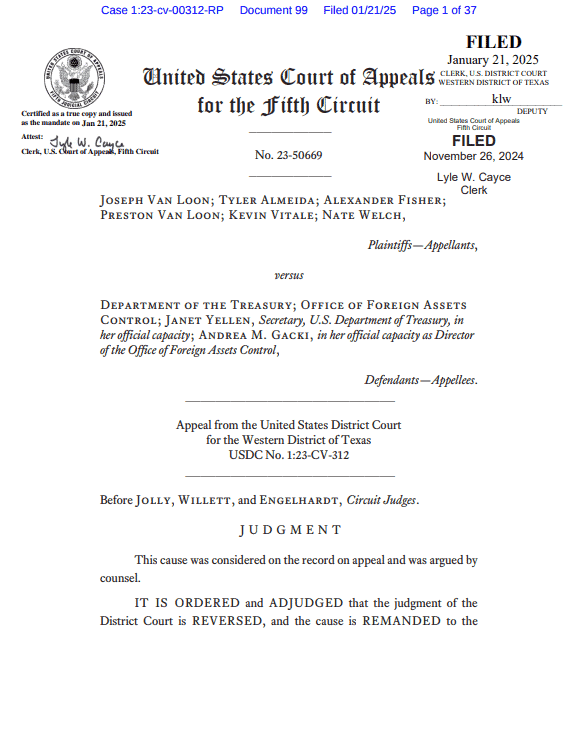
A Texas court has overturned sanctions imposed on privacy protocol Tornado Cash by OFAC, marking a milestone in the defense of privacy technologies in the crypto ecosystem.
The ruling, which is being hailed as a milestone for the cryptocurrency industry, overturns sanctions imposed on privacy protocol Tornado Cash by the U.S. Department of the Treasury’s Office of Foreign Assets Control (OFAC).
The decision, issued on January 21 by the Texas District Court, represents a new victory for the privacy protocol, while also representing a significant endorsement for privacy technologies in the cryptocurrency ecosystem, which have faced increasing scrutiny from regulatory authorities.
The Ruling revokes the sanctions imposed in August 2022, when OFAC accused Tornado Cash of facilitating money laundering and other illicit activities. However, the court found that these sanctions exceeded the federal agency’s authority under the International Emergency Economic Powers Act (IEEPA), setting a crucial precedent in the regulation of decentralized financial technologies.
A landmark ruling for cryptocurrency privacy
The recent decision by the Texas District Court is a clear message in favor of technological innovation and privacy in the crypto world.
Tornado Cash, one of the industry’s most well-known cryptocurrency mixing protocols that allows users to privately and anonymously transact digital assets, had been flagged by OFAC as a tool used by malicious actors, such as North Korean group Lazarus, to launder stolen funds.
However, the court argument that Tornado Cash is not a controllable entity, but rather a set of autonomous and immutable smart contracts. As such, it cannot be treated as an “individual” or “person” under the law, meaning that OFAC’s sanctions were applied incorrectly. The Texas court ruling states that Tornado Cash smart contracts cannot be considered “property” in the legal sense, which limits OFAC’s ability to sanction them.

This verdict is in line with the issued by the United States Court of Appeals for the Federal Circuit in November 2024, which also questioned the sanctions imposed by OFAC on the decentralized protocol.
Experts point out that this new court ruling is not only exonerating Tornado Cash, but also sets an important precedent for other decentralized protocols that could face similar sanctions in the future. The court emphasized that regulation of emerging technologies must balance national security with the protection of innovation and privacy.
Why was Tornado Cash sanctioned?
In August 2022, OFAC added Tornado Cash to its list of sanctioned entities, alleging that the protocol had been used to launder over $7.000 billion in cryptocurrency, including funds stolen by the Lazarus group. Tornado Cash, which allows users to mix transactions to obfuscate their origins, was singled out as a key tool for such illicit activities.
However, defenders of the protocol have argued that it is a neutral tool, similar to cash, which can be used for both good and evil, depending on who uses it. In this way, they have emphasized that the problem is not the tool, but how it is used. They have also pointed out that the protocol has no control over those who use it, since Your smart contracts are autonomous and cannot be modified.
In line with the above, it is worth noting that, despite the sanctions, the use of Tornado Cash has not decreased. In fact, as reported by this media, blockchain data shows that the volume of transactions on the protocol increased after the sanctions, demonstrating that there is no control over who uses it and that users continue to find value in its privacy services.
Alexey Pertsev What's up with the creator of Tornado Cash?
While the Texas District Court ruling is a victory for Tornado Cash, the situation of its co-founder, Alexey Pertsev, remains complicated. Pertsev was arrested in the Netherlands in 2022 and subsequently convicted to five years and four months in prison on money laundering chargesThe Dutch court found that Pertsev and other Tornado Cash developers could have implemented additional measures to prevent illicit use of the protocol, but failed to do so, allowing such activities to flourish.
During his trial in March 2024, Pertsev argued that he could not be held responsible for the actions of users who used Tornado Cash for illegal activities. However, the court rejected this defense, stating that developers bear some responsibility for the use of their creations. This case has been a point of controversy in the crypto community, with prominent figures such as Vitalik Buterin and Edward Snowden voicing their support for the Tornado Cash developers.
A crucial precedent for privacy
Along with the Federal Court of Appeals, the District Court of Texas is setting an important precedent for privacy in the crypto world. Both courts have issued verdicts arguing that the sanctions imposed by the Office of Foreign Assets Control (OFAC) were arbitrary and exceeded its authority. They further hold that Tornado Cash smart contracts are inherently neutral and cannot be effectively used to block transactions by malicious actors.
The crypto community has welcomed the decision, emphasizing that it preserves the right to financial privacy. Some members have also pointed out that this ruling comes in a relevant political context, coinciding with the inauguration of Donald Trump as US president and the release of Ross Ulbricht.
In short, this ruling represents a key victory for privacy and freedom in the crypto space, as it reinforces the idea that technologies designed to improve privacy should not be penalized simply for their misuse by some individuals.
The decision also sets clear limits on the government's ability to impose sanctions on open source technologies based solely on their potential inappropriate use, suggesting that legislative updates may be necessary to adequately address these innovations.


